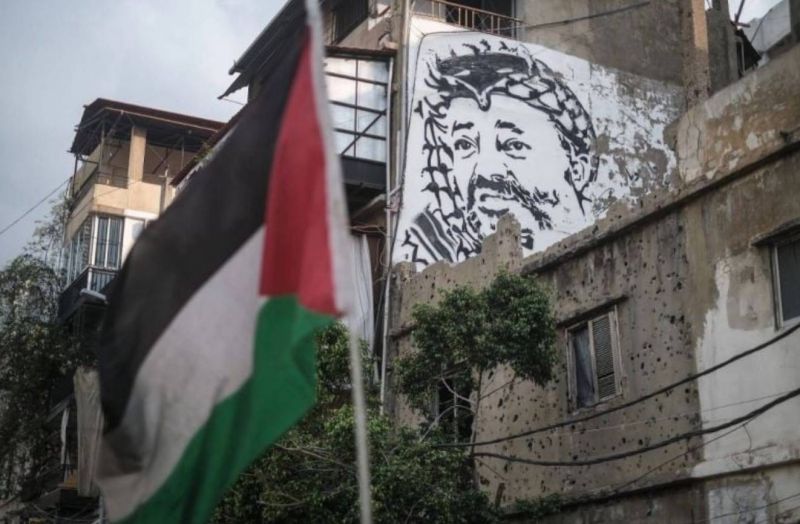
The Palestinian flag raised near the Bourj al-Barajneh refugee camp in the southern suburbs of Beirut, during a demonstration Wednesday, October 11. (Credit: João Sousa/L'Orient Today)
Sitting back in his plastic chair, Hajj Ali*, from Bourj al-Barajneh, is selling potatoes. Transfixed and scrolling through images of what is happening in southern Lebanon, Ali almost forgets he has customers.
“Go resistance fighters, go!” he shouts at his phone, in a manner akin to cheering a football team. “May God protect you!”
On Wednesday morning, Hezbollah fired missiles at Israeli sites from Dhaira in the South “in response to the assassination” of three of its members. In response, Tel Aviv retaliated by shelling Lebanese villages along the border.
On the fifth day of the Hamas-Israel war, tensions between Hezbollah and the Israeli army are high. There is growing concern over the possibility that Lebanon becomes embroiled in the conflict.
Back in 2006, intense Israeli bombardment ravaged Beirut’s southern suburbs, triggering flashbacks to the the dark years of the civil war and the 1982 Israeli invasion of Beirut.
Seventeen years after the 2006 war, everyone in Hezbollah’s suburbian stronghold seems to have a strong opinion — especially since party leader Hassan Nasrallah has not spoken out since the offensive began.
Some residents are ready to welcome any escalation and others hope things won’t go there.
Hajj Ali belongs to the first camp. He is a veteran of the 2006 war and wishes the same destiny on his four sons, aged between 24 and 30, who joined the ranks of the “Resistance.”
“At the moment, they are in Jnoub [South Lebanon],” Hajj Ali said. “Their fate is in God’s hands.”
“I felt victorious and immense pride when I learned that some of Hezbollah fighters died as martyrs [on Monday](...) This will be the last war against Israel,” he said. “And it won’t last long.”
A few steps away from Hajj Ali’s store, Leila* tends to her stall. She says that Hamas’ surprise attack against Israel did not come as a surprise to her.
“Hezbollah and Hamas have been promising us this for a long time. We are much stronger than in 2006,” she says.
“Hezbollah has become the world’s largest army,” Leila added. “But this time, it must not end with talks, but with the end of Israel.”
Hezbollah’s last confrontation with Israel dates to 2006. However, the party’s involvement in the Syrian war allowed it, despite the high casualty cost among its ranks, to hone its military skills and build the experience of its soldiers, who were backed and armed by Iran.
Between 2012 and 2016, Hezbollah lost at least 865 fighters, according to several sources quoted in the Washington Institute for Near East Policy.
For Hezbollah’s supporters, however, defending the Palestinian cause is a “sacred” mission, on which the party has based much of its legitimacy.
“It’s our duty,” says Hussein*, in his forties, who runs a store in Bir al-Abed. He can already see himself taking up arms.
“But first, I’ll find a safe place for my two little ones,” he says. For him, this war will put an end to the economic crisis, which he believes is an “American and Zionist” plot.
“I’d rather die on a battlefield than live a life of humiliation, asking my relatives abroad for help to make ends meet,” Hussein said.
‘The end of Israel’
In the streets of Bir al-Abed, the younger generation seems eager to fight as well.
“In the event of war, we’ll all take up arms, even the teenagers,” says Karim*, 25.
“We have to help the oppressed Palestinians,” adds his friend, Nabil*, 26, who is standing close by. For them, war should have blown up in full throttle the moment Hamas carried out its attack.
“We’re going to be the big surprise of the war, and at the right time,” says Mariam from her shop, the entrance of which is adorned with Hezbollah's and Palestine's flags.
Omar, an Iraq citizen, and Mariam’s husband for over 30 years, is a staunch Hezbollah supporter.
“We will pray in Jerusalem,” says Mariam.
“It’s now or never to defeat them [the Israelis],” Omar adds.
In the event of an all-out war, Omar and Mariam have no intention of hiding in a shelter. “We’ll fight to the death,” says Omar, who has lived in Achrafieh, a predominantly Christian part of Beirut, for over 20 years.
Meanwhile, other residents seem less enthusiastic about the prospect of war.
At 75, Hajj Mohammad*, a spare parts salesman, witnessed almost every conflict.
“I can't take it anymore,” he says. “I’m tired of running away from the bombings.”
In Hay al-Abiad, Samar*, who works in human resources, says she supports the Hamas offensive. “But I don't want it to reach Lebanon,” she says.
In a store on the same street, Radwan* agrees. “Who would want to see their country at war?”
*First names have been changed at the request of the interviewees.
This article was originally published in French in L'Orient-Le Jour. Translation by Sahar Ghoussoub.